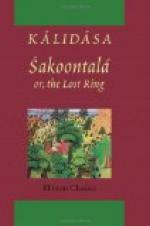2. In these eight forms.
The worshippers of Siva, who were Pantheists in the sense of believing that [S’]iva was himself all that exists, as well as the cause of all that is, held that there were eight different manifestations of their god, called Rudras; and that these had their types in the eight visible forms enumerated here. The Hindus reckon five elements. The most subtle is Ether (akasa), supposed to convey sound, which is its peculiar attribute or property (guna). The next element—Air, has for its properties sound and feeling. The third—Fire, has sound, feeling, and colour. The fourth—Water, has sound, feeling, colour, and taste. The fifth—Earth, has all the other properties, with the addition of smell.
3. An audience of educated and discerning men.
Lit. ‘An audience, who are chiefly men of education and discernment.’ Few could have been present at these dramatic representations excepting learned and educated men. The mass of the composition being in Sanskrit, would not have been intelligible to the vulgar and illiterate.
4. [S’]akoontala; or, The Lost Ring.
The literal title is ’[S’]akoontala recognized by the token or ring.’
5. The present Summer season.
Hindu poets divide the year into six seasons of two months each, viz. I. Spring (Vasanta), beginning about the middle of March; or, according to some, February. 2. Summer (Grishma). 3. Rains (Varsha). 4. Autumn (Sarad). 5. Winter (Hemanta). 6. Dews (Sisira). Practically, however, there are only three seasons in India, 1. The hot season. 2. The rains. 3. The cold weather. In Lower Bengal and Behar, the first of these seasons begins in March, the second in June, and the third in November. The temperature of the cold season is highly exhilarating, and the climate is then superior to that of any portion of the English year. In Calcutta, this season continues for about three months; in Upper India, for about five; and in the Panjab for about seven. The rains in Bengal Proper are more violent and protracted than in Hindustan and the Panjab. In the latter country they last for hardly more than two months, and even then only fall at intervals. Plays were acted on solemn and festive occasions, on lunar holidays, and especially at the changes of the season.
6. Of fragrant Patalas.
The Patala or trumpet-flower; Bignonia suaveolens.
7. With sweet [S’]irisha flowers.
The flowers of the Acacia Sirisha were used by the Hindu women as ear-ornaments.
8. King Dushyanta.
For the genealogy of King Dushyanta see Introduction, page xxxviii.
9. That wields the trident.
[S’]iva is called Pinakin, that is, ‘armed with a trident,’ or according to some, a bow named Pinaka. Siva not being invited to Daksha’s sacrifice, was so indignant, that, with his wife, he suddenly presented himself, confounded the sacrifice, dispersed the gods, and chasing Yajna, ‘the lord of sacrifice,’ who fled in the form of a deer, overtook and decapitated him.




